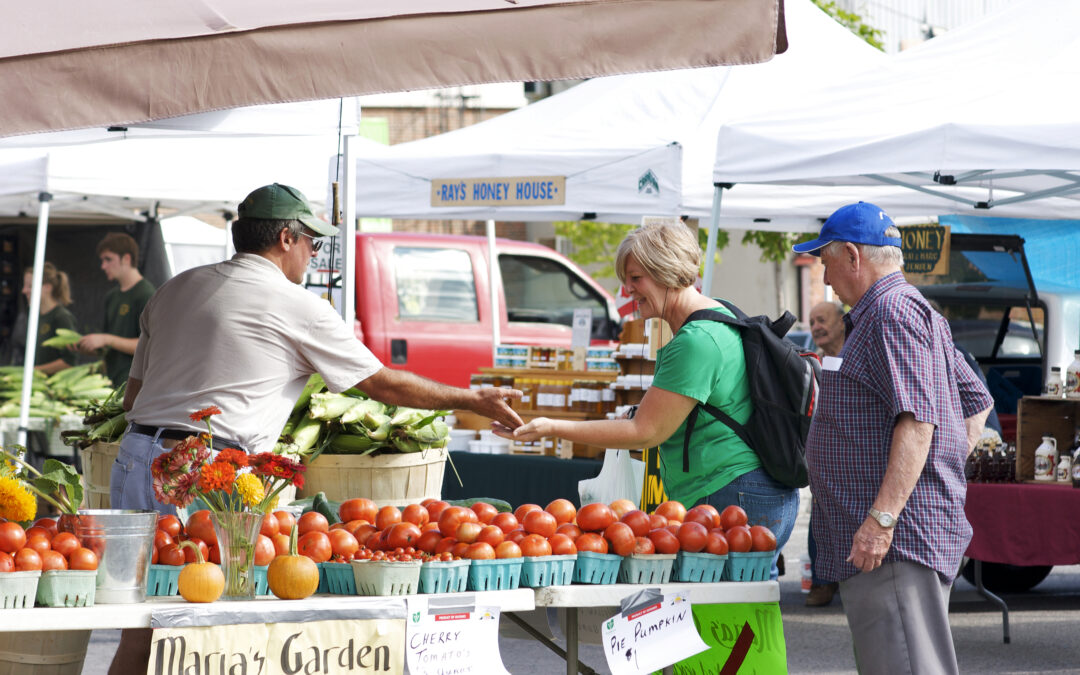In the bustling heart of communities, farmers markets stand as vibrant testaments to the enduring connection between growers and consumers. More than mere marketplaces, these lively gatherings serve as vital conduits linking local farmers directly with individuals hungry for fresh, flavorful produce and artisanal goods. In this exploration, we’ll embark on a journey from field to table, uncovering the multifaceted role of farmers markets in nurturing local food economies and fostering vibrant communities.
A Celebration of Local Agriculture
Step into a farmers market, and you’re immediately greeted by a symphony of colors, scents, and flavors. From vibrant displays of seasonal fruits and vegetables to artisanal cheeses, freshly baked bread, and aromatic herbs, the abundance of local produce is a testament to the rich tapestry of regional agriculture. Farmers markets offer consumers the opportunity to connect directly with the people who grow their food, fostering transparency, trust, and a deeper appreciation for the origins of what we eat.
Beyond the array of fresh produce, farmers markets also celebrate the cultural heritage of the region. Farmers often bring heirloom varieties and traditional crops that reflect the local climate and culinary traditions, offering a taste of the area’s unique flavors and culinary history. Visitors can engage with farmers, learn about their farming practices, and gain insights into the stories behind each product, enriching their understanding of the agricultural landscape and fostering a sense of pride in supporting local growers.
Promoting Sustainability and Resilience
Sustainability lies at the heart of farmers markets, where the emphasis is on reducing environmental impact and supporting local food systems. By sourcing directly from local farmers, consumers reduce the carbon footprint associated with food transportation and distribution. Locally grown food travels shorter distances, minimizing fuel consumption and greenhouse gas emissions. Moreover, many farmers markets prioritize organic, pesticide-free, and heirloom varieties, promoting biodiversity and preserving traditional farming practices that prioritize soil health and ecosystem resilience.
In addition to supporting sustainable farming practices, farmers markets often incorporate eco-friendly initiatives into their operations. They encourage vendors to use reusable or compostable packaging, reducing waste and minimizing environmental impact. Some markets implement recycling programs, provide composting facilities, or offer incentives for customers who bring their own bags or containers. These efforts demonstrate a commitment to environmental stewardship and inspire consumers to adopt more sustainable habits in their daily lives.
Fostering Community Connections
Beyond being marketplaces, farmers markets serve as vibrant community hubs where neighbors gather to socialize, share stories, and celebrate local culture. Families meander through the stalls, engaging with farmers and artisans, sampling seasonal delights, and discovering unique products crafted with care. Food vendors offer an array of ready-to-eat meals, showcasing the culinary diversity of the region and providing a platform for chefs to highlight their talents. Live music, cooking demonstrations, and educational workshops add to the festive atmosphere, creating opportunities for learning, connection, and cultural exchange. Farmers markets strengthen social bonds, build a sense of belonging, and foster a shared appreciation for local food and community resilience.
Supporting Economic Vitality
Farmers markets play a vital role in supporting the economic vitality of communities by providing income opportunities for local farmers, artisans, and food entrepreneurs. By selling directly to consumers, farmers can command fair prices for their products, ensuring a sustainable livelihood for themselves and their families. Additionally, farmers markets attract foot traffic to downtown areas and public spaces, stimulating economic activity for local businesses and contributing to the vibrancy of urban and rural landscapes. Studies have shown that every dollar spent at a farmers market generates a multiplier effect, circulating wealth within the community and strengthening the local economy. By supporting farmers markets, consumers not only gain access to fresh, high-quality food but also invest in the prosperity of their communities.
Conclusion: Nourishing Communities, Sustaining Traditions
As we conclude our exploration of farmers markets, it’s evident that these vibrant gatherings are more than just places to buy food—they are cornerstones of community resilience, environmental sustainability, and economic vitality. By patronizing farmers markets, we not only nourish our bodies with fresh, healthy food but also invest in the well-being of our neighborhoods, strengthen social connections, and celebrate the richness of local agriculture and culture. So, the next time you visit a farmers market, take a moment to savor the experience, knowing that you are contributing to a more sustainable future and preserving the traditions that sustain us all.

